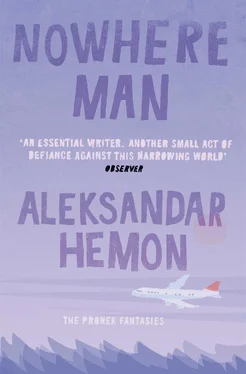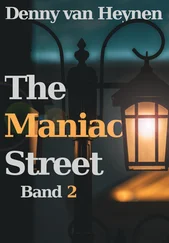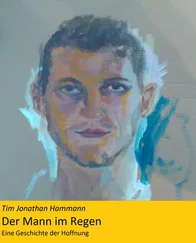“You find my dog,” a dark-skinned woman asked me. She accosted me in front of my building, as if she’d been waiting for me. “I losed my dog.”
“No, I am sorry,” I said.
“You sure? Little dog.”
“I am sure.”
She went on down the street, looking between and under the cars and into the narrow spaces between buildings, yelling, “Lucky Boy!” all along. I could hear the storm rumbling away.
I walked into my apartment, the floors creaked me a welcome, and I suddenly felt a tide of warm giddiness overwhelming me, dewing my neck. I sat down on the floor, where the futon used to be, in my jacket, with a frightening premonition that most of the things in this world would go on existing whether I lived or died. There was a hole in the world, and I fit right into it; if I perished, the hole would just close, like a scar healing. I should have told Pronek who I was, I needed him to know. “Lucky Boy!” I heard the woman shouting. “Where are you? Where you go?”

SARAJEVO, SEPTEMBER 10, 1967-
JANUARY 24, 1992
Jozef Pronek was bornin the Sarajevo maternity hospital, on September 10, 1967, after thirty-seven hours of excruciating labor, the culmination of which was his mother’s oath, as Jozef’s little head was stuck between her legs halfway into the world, that she would strangle him with her own hands if he didn’t come out immediately. His mother regretted her threat the moment she saw his crumpled face, dominated by a screaming mouth, like an Expressionist painting. In her delirium she found it extraordinarily beautiful.
It was that very same Expressionist face that was exhibited to Jozef’s father, who was outside in the sunny hospital park littered with drunken fathers. Pronek Sr. labored to stand straight, propped up by his friend Duško, with whom he had celebrated his son’s arrival into this woeful world. In a moment of peculiar inspiration, seeing his wrinkled, furious face, Father compared him to the notorious Tshombe, the man who killed Patrice Lumumba. Duško, on the other hand, found the nascent Jozef to resemble Mahatma Gandhi, perhaps because of a sheet of gauze wrapped across his minikin chest. On little Jozef’s part, all he can remember (he still implausibly claims) from that day — the first in an as yet unconcluded sequence of days that constitute his life — was a frightening deluge of blazing light coming at him through the window pane, as if the first thing he ever saw were a nuclear explosion.
Jozef’s infancy was typically uneventful: sucking, sleeping, shitting, diaper-changing, sleeping, sucking, burping, and so on. Out of the molten lava of his early experiences, a few awkward rocks formed: during an afternoon stroll along the Miljacka River a chestnut in its spiky armor fell directly into his lap; a neighbor’s dog thrust his head into the shade of the perambulator and licked Jozef’s face; during a diaper change, he peed in a perfect arc on an electric heater, discontinuing the stream just in time not to get electrocuted, the piss evaporating like an unfinished dream; a mouse, indigenous to the damp basement apartment his parents were renting, crawled into his crib and onto his stomach, whereupon Jozef put his hand around it and grasped the furry, warm body, throbbing with life and fear.
As for Jozef’s toddlerhood, it was rather more eventful: his drunken uncle Dragan (who would, many years later, driving to the seaside through the Neretva canyon, give a left-turn signal and steer his car into the abyss) dangled him over the balcony fence: gravity stretched out his crooked little legs and strained his arms to the verge of shoulder dislocation. I must mention his first independent walking expedition, whereby Jozef escaped his mother’s attention, entered the elevator, and then toddled over to Hotel Bristol, armed with nothing but a pacifier. There he encountered a busload of Chinese table-tennis players, all competitors in the Table Tennis World Championship — one of them juggled Ping-Pong balls, mesmerizing Jozef and impeding his advance until the distraught arrival of his mother. I should also submit a picture of Jozef with the hairdo of a provincial basketball coach, tottering toward the camera with a hand extended, ever eager to go beyond the boundaries of his domain.
Perhaps it was Jozef’s adventurous spirit proving to be a little too much for his parents that made them import Grandma Natalyka from the countryside. Grandma Natalyka arrived late one night in a dark dress, equipped with boxy suitcases. She kissed his parents without submitting to an urge to smile, then looked at Jozef with a serious face, as if assessing the amount of work necessary to mold this chunk of raw humanity into a decent person. Hence Jozef’s childhood is marked by Grandma Natalyka’s doting presence: she provided milky meals in the morning; she administered afternoon walks and supervised playground activities. She protected him from unmerited (and merited) pushes and punches. This might have prevented Jozef from developing lasting playground friendships — upon Grandma Natalyka’s merciless fillip or bloodcurdling shout, other kids, backed by much feebler forces (adolescent distant cousins; baby-sitters reading romances; simply nobody), kept their distance. There he is: digging a meaningless hole in the sandbox with a plastic shovel misshapen by his anger, while everybody else is gathered on the other end of the sandbox, filling up one another’s buckets with sand. And there is Grandma Natalyka, looming on the horizon like a battleship, furiously knitting another warm sweater for little Jozef.
She strictly enforced afternoon naps, mitigating her strictness by scratching Jozef’s head until he fell asleep. After the nap, Jozef would have to endure a rehearsal of her knitted collections — he stood still for many long minutes, fully dressed in a wool sweater (stretching his arms out, as if he were sending a semaphore message, the sleeve-ends hanging over his fingers), wearing a pair of mittens and a hat with a cluster of silly pompoms. He would desperately await his parents’ return from work, and then revel in their attention: he would employ his father’s gigantic foot as a hobbyhorse, while his father watched the news cross-legged; he would listen to his mother singing Bosnian songs while ironing, occasionally reaching piercing heights, which would make his father turn up the TV. Grandma Natalyka would retreat into her room and do the who-knows-what of elderly women.
She returned at bedtime to deliver stories. He was squeezed between a cold wall and her warm body, his head in her armpit bay exuding the scent of cinnamon and sauerkraut brine. She narrated a cycle of stories featuring a gallery of animals that all lived in the far-off land of her childhood. There was a brave ewe, who attacked trespassers and thieves and passersby. There was a dog who thought of the kids as sheep until he got so old that he had to be killed with an ax blow to the head. There was a swarm of bees that her grandfather made hang from his pate like hair to the kids’ delight. There was even a dolphin that came in one day with a carny. It was supposed to jump through hoops, but instead lay sunk and puffing at the bottom of a hole full of cold, muddy water the kids (paid in candy currency) brought in buckets from the local well. Before landing on the soft cushion of sleep, he speculated about the dolphin’s fate: he imagined a savior buying it from the carny; he imagined the dolphin running away with the help of other carny animals; he imagined a numinous boy with resurrective powers. But the salvation never came in time — the dolphin suffocated, despite all the imaginative effort he put into it. Often Jozef would slip into a dream that did not care about the dolphin but carried along according to its own cruel, selfish logic — Grandma Natalyka or his parents were dying, he could do nothing to stop it, and he would wake up weeping. Grandma would be asleep, the steady hum of her snoring increasing. He would watch her dream-frown, feeling the rumble of her slumber, the slight vibrations of her upper lip and nostrils as she exhaled.
Читать дальше













